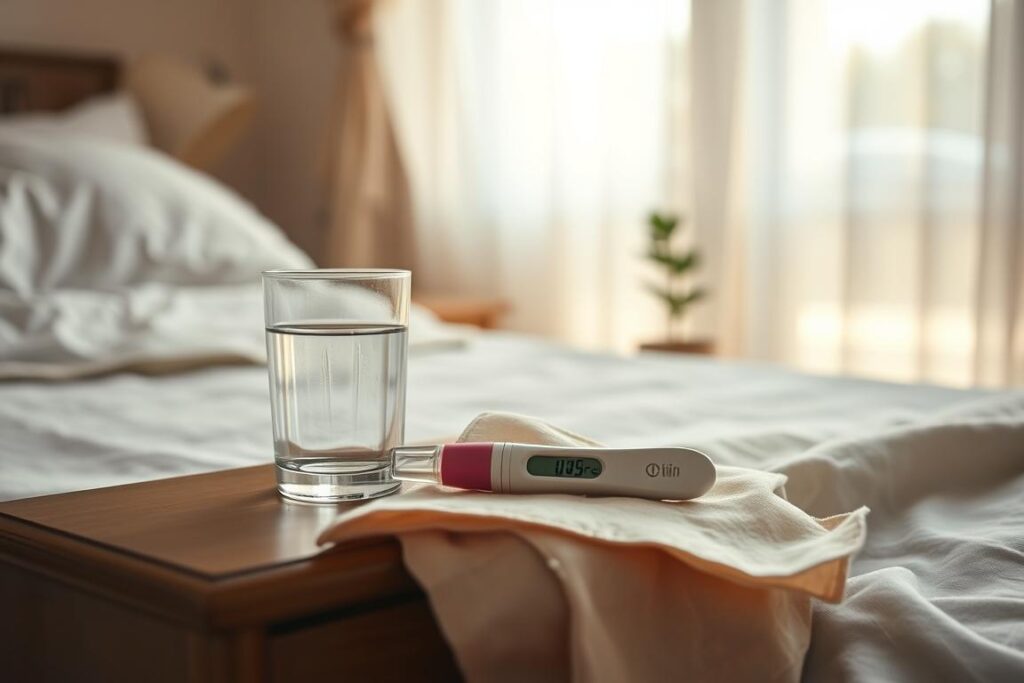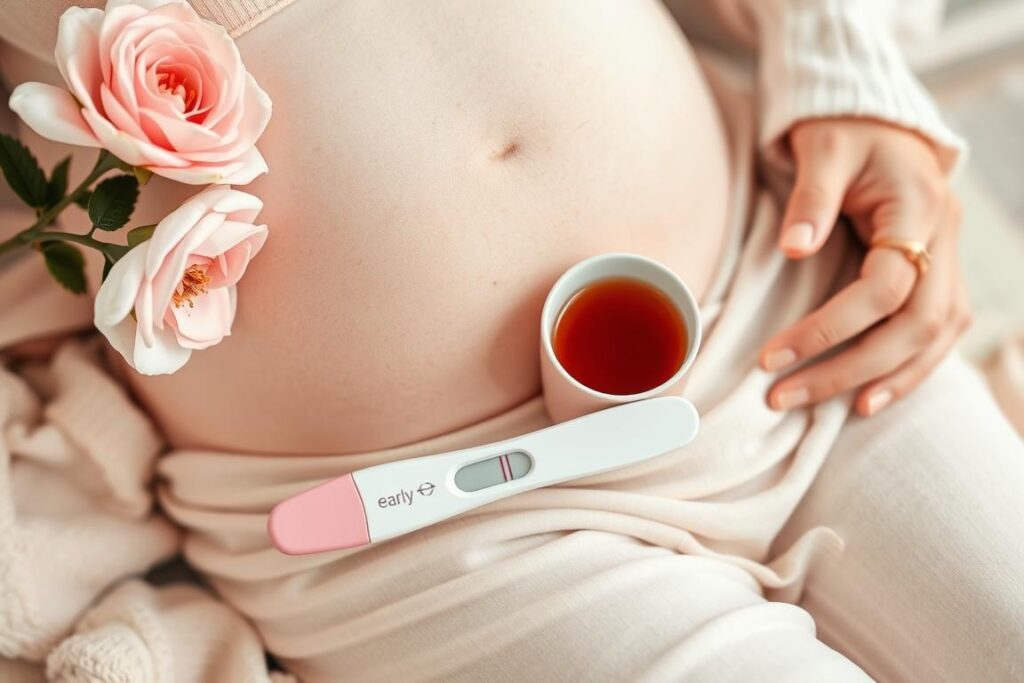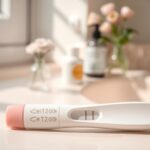Discovering you’re pregnant can be both exciting and daunting. The first week is key, with small body changes that signal a new journey. Knowing the early signs of pregnancy helps you see the amazing changes happening inside you.
In the early stages of pregnancy, your body goes through many changes. These changes can show up in different symptoms. They include hormonal shifts and physical changes, giving clues about how your baby is growing.
Key Takeaways
- Pregnancy symptoms can start as early as the first week, even before a missed period.
- Common early signs include hormonal changes, breast tenderness, fatigue, and increased sensitivity to certain foods or smells.
- Recognizing these subtle cues can help you identify the onset of pregnancy and seek timely medical care.
- It’s important to consult with your healthcare provider to confirm pregnancy and receive appropriate guidance and support.
- Understanding the early stages of pregnancy can help you prepare your body and mind for the exciting journey ahead.
Understanding Week 1 of Pregnancy: When Does It Actually Begin?
The first week of pregnancy might seem confusing. It doesn’t start when the egg is fertilized. Instead, it’s based on when a woman’s last menstrual period (LMP) was.
How Doctors Calculate Pregnancy Weeks
Doctors start counting pregnancy weeks from the first day of the LMP. This is because the LMP is the most accurate way to know when pregnancy starts. Even though conception happens about two weeks later, the first week is still counted from the LMP.
The Role of Last Menstrual Period (LMP)
The LMP is key for doctors. It helps them figure out when the baby is due and track the baby’s growth. By knowing the LMP, doctors can guess when conception happened, which is about two weeks after the LMP.
Conception Timeline Explained
Conception happens during the fertile window, around ovulation. Ovulation is when the egg is released, usually in the middle of the cycle. After the egg is released, it can be fertilized by a sperm. This usually happens within the first two weeks of pregnancy, before the pregnancy calculation starts.
| Event | Timing |
|---|---|
| Last Menstrual Period (LMP) | Day 1 of pregnancy calculation |
| Ovulation | Around day 14 of the menstrual cycle |
| Conception | About 2 weeks after LMP |
| Gestational age | Calculated from LMP |
“Understanding the timeline of conception and the role of the last menstrual period is key to accurately tracking the gestational age of a pregnancy.”
Pregnancy Symptoms Week 1: Common Early Signs
The first week of pregnancy might not show big changes, but some women notice small signs. These signs, known as implantation symptoms or early pregnancy indicators, are key. They help women understand they are pregnant early on.
A missed or late period is a common sign in the first week. It shows the body is changing to support a growing embryo.
- Tender or swollen breasts
- Increased sensitivity to certain smells or tastes
- Mild cramping or light spotting, which may be a sign of implantation
- Fatigue or increased tiredness
- Mood changes, such as irritability or heightened emotions
Not every woman will notice these early pregnancy indicators right away. How and when symptoms appear can differ. It’s crucial to pay attention to any changes and talk to a doctor if you think you might be pregnant.
| Symptom | Description |
|---|---|
| Missed or Delayed Period | A missed or late period is a common early sign of pregnancy. It shows hormonal changes that signal a new pregnancy. |
| Breast Tenderness | Breasts may swell, hurt, or feel more sensitive due to hormone spikes in early pregnancy. |
| Fatigue | Feeling very tired is common in the first weeks. The body is adjusting to hormonal changes and the demands of growing a new life. |
By noticing these early pregnancy indicators and implantation symptoms, women can understand the early changes in their bodies. This helps them get medical advice early and prepare for the journey of pregnancy.
Physical Changes During the First Week
The first week of pregnancy brings many physical changes. These changes show the start of a new journey. Hormonal shifts, changes in basal body temperature, and cervical mucus variations are key signs of early pregnancy.
Hormonal Fluctuations
When the fertilized egg implants, the body starts making the pregnancy hormone, human chorionic gonadotropin (hCG). This hormone causes early symptoms like fatigue, nausea, and tender breasts.
Body Temperature Changes
A slight increase in basal body temperature is another change. This small rise, often less than a degree Fahrenheit, hints at ovulation and possible pregnancy.
Cervical Mucus Variations
Expectant mothers may also see changes in their cervical mucus in the first week. The mucus becomes thicker, creamier, and more abundant. This shows the body is getting ready for implantation and early pregnancy.
These changes, though small, offer important clues about early pregnancy. By tracking these signs, women can stay informed and make smart health choices during this time.
Emotional and Mental Changes in Early Pregnancy
Pregnancy is a wild ride of emotions, especially in the first week. Hormonal changes can lead to mood swings, from feeling on top of the world to feeling anxious or even depressed. Understanding these pregnancy emotions can help manage mental health in early pregnancy.
Heightened sensitivity is a common feeling in the first week. Hormonal changes, especially the rise in estrogen and progesterone, make emotions more intense. This can cause sudden tears, irritability, or intense joy and excitement.
“I felt like I was on an emotional rollercoaster during those first few weeks. One minute, I was thrilled to be pregnant, and the next, I was in tears over something insignificant.”
Anxiety and worry are also common. Women may worry about the baby’s health or their own body changes. These feelings are normal and show how deeply pregnancy affects a woman’s mind and heart.
- Mood swings and heightened emotions
- Increased anxiety and worry about the pregnancy
- Feelings of joy, excitement, and anticipation
- Difficulty focusing or concentrating
- Increased need for rest and self-care
Women should be kind to themselves during this time. The emotional and mental changes are a natural part of pregnancy. By recognizing these feelings, getting support, and taking care of themselves, women can get through the early stages of pregnancy more easily.
When to Take a Pregnancy Test
Finding the right time to take a pregnancy test is key for getting accurate results. Home pregnancy tests are now easy to find, letting women check for pregnancy at home. But, it’s important to know how these tests work to get reliable results.
Types of Pregnancy Tests Available
There are many home pregnancy tests on the market. They all look for human chorionic gonadotropin (hCG), a hormone that shows up when you’re pregnant. Some tests can find hCG levels that others can’t. Talking to a healthcare provider can help you pick the best test for you.
Best Time for Accurate Results
The best time to take a pregnancy test is after you’ve missed your period. This is when hCG levels are highest, making it easier to get a positive result. But, if your cycle is different, wait at least 1-2 weeks after when you were expecting your period.
Understanding False Negatives
False negatives can happen, even with sensitive tests. This might be because you took the test too soon. If you get a negative result but think you might be pregnant, wait a few days and try again. Or, see a healthcare provider for more help.
Knowing how home pregnancy tests work helps women decide when to take them. This way, they can understand their results better.
| Test Type | Sensitivity (mIU/mL) | Earliest Positive Result |
|---|---|---|
| First Response Early Result | 6.3 | 6 days before missed period |
| Clearblue Digital | 20 | 1 day before missed period |
| Equate Early Result | 25 | 1 day before missed period |
“The key to accurate pregnancy test results is understanding the sensitivity of the test and the timing of when it’s taken. By following the manufacturer’s instructions and being patient, women can feel confident in the reliability of their home pregnancy test results.”
Preparing Your Body for Early Pregnancy
Getting your body ready for early pregnancy is key to a healthy journey. Whether you’re trying to conceive or just planning ahead, focus on preconception health, fertility preparation, and healthy pregnancy habits. These steps can really help.
Eating a balanced diet is a big part of preconception care. Eat lots of fruits, veggies, whole grains, and lean proteins. This ensures you get all the vitamins and minerals you need. Also, think about taking a good prenatal vitamin to cover any gaps.
Regular exercise is also vital. Do activities like walking, swimming, or prenatal yoga to stay fit. But, don’t overdo it. Too much exercise can mess with your hormones and the baby’s growth.
Managing stress is important too. Try meditation, deep breathing, or hobbies to keep your mind and heart happy. Getting enough sleep and rest is also key for a healthy start.
Finally, tackle any health issues before you conceive. Talk to your doctor about diabetes, thyroid problems, or other chronic conditions. These can affect your fertility and pregnancy.
By getting ready for early pregnancy, you boost your chances of a smooth journey. This sets you up for a wonderful and fulfilling pregnancy experience.
Essential Nutrients and Supplements for Week 1
Pregnancy is a big change, and the first week is key for your baby’s growth. It’s important to eat right during this time. Let’s look at the nutrients and supplements you need early on.
Importance of Folic Acid
Folic acid, or vitamin B9, is very important in early pregnancy. It helps prevent serious birth defects of the brain and spine. Women should take at least 600 micrograms of folic acid every day, even before they get pregnant. This vitamin helps with the fast cell growth and division in the first weeks.
Recommended Prenatal Vitamins
A good prenatal vitamin is a great help. Look for one with lots of vitamins and minerals like calcium, iron, and vitamin D. These nutrients are good for both you and your baby.
Dietary Considerations
Your diet is also very important. Eat foods that are full of nutrients. Here are some good ones:
- Leafy green vegetables: Spinach, kale, and broccoli are full of folic acid and other important nutrients.
- Whole grains: Whole wheat bread, oats, and quinoa give you complex carbs and fiber.
- Lean proteins: Lean meats, poultry, fish, and legumes help your baby grow.
- Healthy fats: Avocados, nuts, and olive oil help you absorb vitamins.
Eating well and taking the right supplements can help start your pregnancy off right.
When to Contact Your Healthcare Provider
Starting your pregnancy journey means building a strong bond with your healthcare provider. In the first week, some situations need quick medical help to keep you and your baby safe.
If you notice any of these signs, call your doctor or midwife right away:
- Severe abdominal pain or cramping
- Vaginal bleeding or spotting
- Persistent nausea and vomiting, making it hard to stay hydrated
- Dizziness or fainting spells
- Sudden changes in mood or mental health concerns
Don’t ignore these early prenatal care worries. They might show serious issues or need medical advice for pregnancy concerns. It’s safer to talk to your healthcare provider for help and support.
Even without scary symptoms, see your doctor early in pregnancy. Your first visit helps confirm the pregnancy and checks your health. It also starts a care plan for a healthy early prenatal care journey.
Your healthcare provider is there to help you all through pregnancy. Don’t be shy to ask questions or share worries. By tackling pregnancy concerns and following medical advice, you’re setting your baby up for a great start.
Lifestyle Changes to Consider
Pregnancy is a big change, and starting with healthy habits is key. As you begin this journey, think about these healthy pregnancy habits, pregnancy dos and don’ts, and lifestyle adjustments. They will help you stay well and support your baby’s growth.
Exercise with Care
Being active during pregnancy is good, but talk to your doctor first. Choose low-impact activities like walking, prenatal yoga, or swimming. They keep you strong and flexible without too much strain.
Nourish Your Body
Eating well is vital for a healthy pregnancy. Eat whole foods and watch your portion sizes. Include fruits, veggies, whole grains, lean proteins, and healthy fats. This way, you and your baby get the nutrients you need.
Prioritize Rest and Relaxation
Pregnancy can be tough, so rest is key. Aim for 7-9 hours of sleep each night. Try stress-reducing activities like meditation, gentle stretching, or prenatal massage.
Avoid Harmful Substances
Stay away from harmful things like alcohol, tobacco, and some medicines early on. Talk to your doctor about any medicines or supplements you’re taking. Make sure they’re safe for you and your baby.
By starting these lifestyle adjustments early, you’re setting a good path for your pregnancy. Remember, every pregnancy is different. Work with your healthcare team to find what’s best for you.
| Pregnancy Dos | Pregnancy Don’ts |
|---|---|
|
|
By starting these lifestyle adjustments early, you’re setting a good path for your pregnancy. Remember, every pregnancy is different. Work with your healthcare team to find what’s best for you.
Conclusion
Starting your pregnancy journey is an exciting time. It’s important to know what to expect in the first week. This article has shared insights into the physical, emotional, and mental changes you might go through.
Keep in mind, every pregnancy is different. Your experiences might not match what’s been discussed. Always talk to your healthcare provider for personalized advice. They can help you through the first trimester and beyond.
Enjoy the changes and take care of yourself. Look forward to the amazing experiences that await you. The first trimester might have its challenges, but with the right information and care, you can start this new chapter with joy and hope.
FAQ
What are the early signs of pregnancy?
Early signs of pregnancy include a missed period and tender breasts. You might also feel very tired, nauseous, or need to pee a lot. Some women also have cravings or dislike certain foods.
When does pregnancy actually start?
Pregnancy starts from the first day of your last period. This is even though you conceive and the embryo implants later. The first week is counted from this day.
How can I tell if I’m experiencing implantation symptoms?
Implantation symptoms are light spotting or cramping 6-12 days after conception. You might also smell things more, have sore breasts, and feel very tired.
What physical changes occur during the first week of pregnancy?
In the first week, you might feel hormonal changes and a slight temperature rise. Your cervical mucus might also change.
How might my emotions change in early pregnancy?
Mood swings and feeling more sensitive are common early on. You might also feel anxious or excited due to hormonal shifts.
When is the best time to take a pregnancy test?
Take a pregnancy test after your first missed period for the most accurate results. Home tests can find the pregnancy hormone hCG as early as 8-10 days after conception.
What nutrients are important in early pregnancy?
Folic acid, iron, and prenatal vitamins are key in the first weeks. They help the fetus grow and keep you healthy.
When should I contact my healthcare provider about my pregnancy?
Book your first prenatal visit as soon as you know you’re pregnant. Call your provider if you have severe symptoms or concerns.
What lifestyle changes should I consider in early pregnancy?
Make healthy changes to your diet, exercise, and sleep. Avoid alcohol and tobacco to support a healthy pregnancy.











